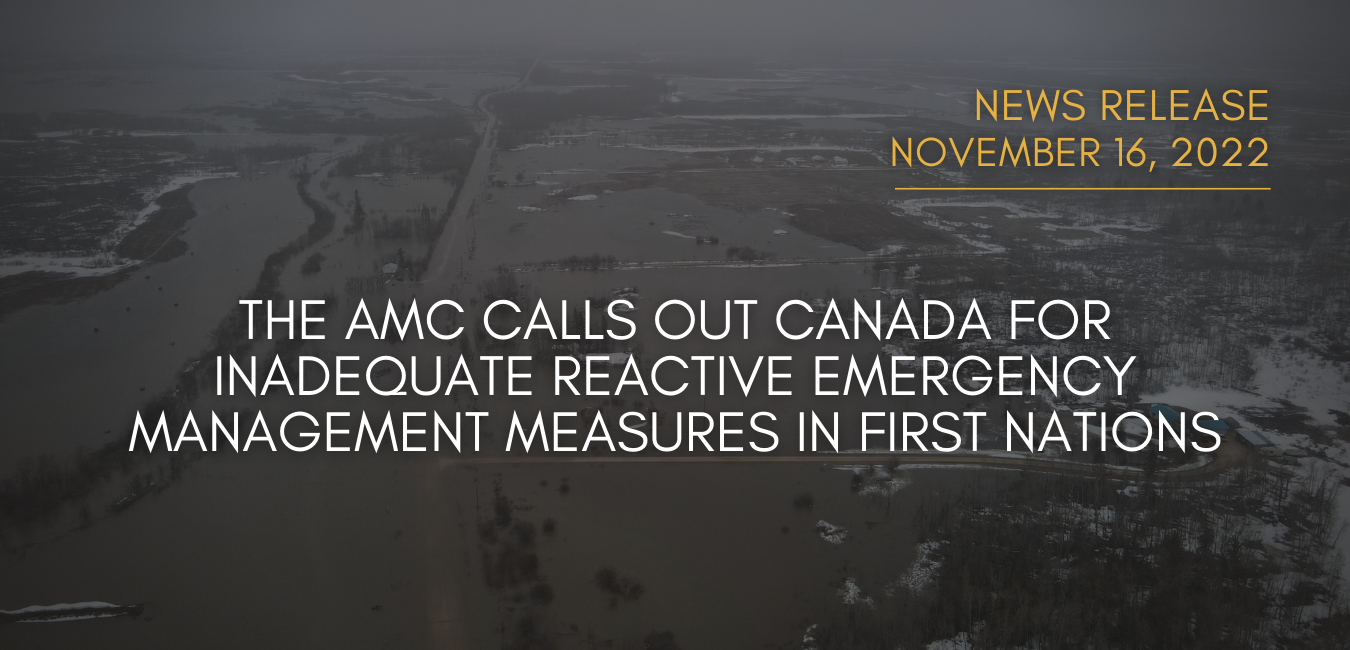The AMC calls out Canada for Inadequate Emergency Management Measures in First Nations

November 16, 2022
Treaty One Territory, Manitoba
alexpapineau
Treaty One Territory, Manitoba –The Assembly of Manitoba Chiefs (AMC) issues this statement in response to the Auditor General of Canada’s report: Emergency Management in First Nations Communities. The Auditor General of Canada noted that Canada spends more than three and a half times the money responding to and recovering from these emergencies than it would by providing the communities with the structural mitigation to prevent these emergencies in the first place or enhance their ability to respond to them.
“It is deeply concerning that this 2022 Auditor General of Canada’s report to the Parliament of Canada on Emergency Management in First Nations outlines the same issues we have been advocating on for years,” said Grand Chief Cathy Merrick. “First Nations, such as the Peguis First Nation, encounter flooding year after year in Manitoba and have put in proposals asking for this basic level of support. They must prepare for and respond to emergencies such as flooding while simultaneously trying to prevent future catastrophes. The loss of homes and the community’s critical infrastructure year after year is devasting, as is the constant stress on families when they must evacuate. It also places First Nations in financial crisis when they have to respond to these emergencies, replace infrastructure, and wait for reimbursement.”
Over the past 13 years, First Nations experienced more than 1,300 emergencies leading to more than 580 evacuations and affecting more than 130,000 people. Over the last four fiscal years (2018–19 to 2021–22), Indigenous Services Canada (ISC) spent about $828 million on emergency management supports for First Nations communities. As of April 2022, 39% of proposed structural mitigation projects were eligible but remain to wait for funding.
“There is a need to address how we deliver Emergency Management Services in the Manitoba region for First Nations,” said Grand Chief Merrick. “The all-hazard, half-hazard response led by governments is ineffective. It is a devastatingly slow response time and an irresponsible funding model. We must advocate and lobby for a new way of delivering Emergency Management Services. One that reflects the needs of First Nations and ensures that there is the continuous capacity enhancement in each First Nation for the health and safety of their citizens and the full recovery of their Nations.”
-30-
For more information, please contact:
Communications Team
Assembly of Manitoba Chiefs
Email: media@manitobachiefs.com
About the Assembly of Manitoba Chiefs
The AMC was formed in 1988 by the Chiefs in Manitoba to advocate on issues that commonly affect First Nations in Manitoba. AMC is an authorized representative of 62 of the 63 First Nations in Manitoba with a total of more than 151,000 First Nation citizens in the province, accounting for approximately 12 percent of the provincial population. AMC represents a diversity of Anishinaabe (Ojibway), Nehetho / Ininew (Cree), Anishininew (Ojibwe-Cree), Denesuline (Dene) and Dakota Oyate (Dakota) people.